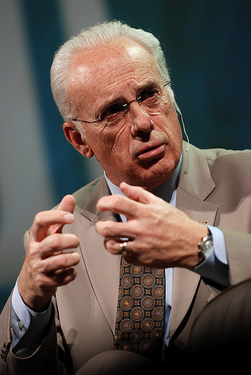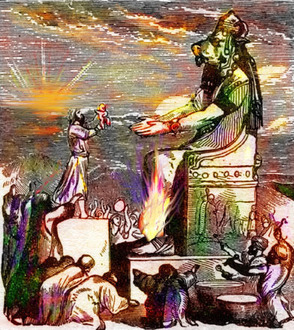Is Idolatry linked to
sexual shrine prostitution?
Yes, Idolatry is linked to sexual shrine prostitution.
 |
Qedesh stele, 1400 BC
ancient fertility goddess,
from The Louvre collection
Many non-gay Christians challenge our assertion that Leviticus 18:22 and 20:13 and Romans 1:26-27 and
1 Cor 6:9 and 1 Tim 1:10 all deal with sexual misconduct linked to idolatry and cult or shrine prostitution and yet, unrelated to being gay or lesbian.
Some non-gay Christians insist that there is no historical evidence that cult prostitutes engaged in sexual worship of the fertility goddess. The quotes on this page indicate that conservative Christian commentators for hundreds of years have written and taught that ancient fertility goddess worship or shrine prostitution was sexual in nature.
Many non-gay Christians view gay Christian beliefs as historical revisionism, as nothing more than self-serving efforts by gay Christians to create a plausible alibi for sin. There is an enormous difference between (1) cult or shrine or temple prostitutes and (2) homosexuals.
No honest person equates the two groups unless he is bent on intentional deception. Even conservative Calvinist commentators like Pastor John MacArthur acknowledge the reality of temple prostitutes and temple prostitution in biblical times. For example:
The Bible comments about the
Idolatry of Old Testament Israel
"And the children of Israel did secretly those things that were not right against the LORD their God, and they built them high places in all their cities, from the tower of the watchmen to the fenced city.
And they set them up images and groves in every high hill, and under every green tree:
And there they burnt incense in all the high places, as did the heathen whom the LORD carried away before them; and wrought wicked things to provoke the LORD to anger:
For they served idols, whereof the LORD had said unto them, Ye shall not do this thing." 2 Kings 17:9-12
 |
Bible Scholars comment about Israel's Idolatry in OT and NT times
John MacArthur
In the mid first century AD, Paphos on the island of Cyprus was "a great center for the worship of Aphrodite [Venus]... The greatest festival in Cyprus in honor of Aphrodite was the Aphrodisia, held for three days each spring. It was attended by great crowds not only from all parts of Cyprus but also from surrounding countries." The Wycliffe Historical Geography of Bible Lands, Charles F. Pfeiffer and Howard F. Vos, Chicago: Moody, 1967, pp. 305-6.
About Paphos, John MacArthur writes: "It was a city rife with immorality: "Extensive religious prostitution accompanied [Aphrodite's] rites at Paphos." citing (Pfeiffer and Vos, p. 306." The MacArthur New Testament Commentary, Acts 13-28, Chicago: Moody, 1996, p. 8.
On the rest of this page we quote from other non-gay Christian and Jewish commentators who over the centuries agree with the gay Christian position (even though most of the commentators we quote would not have been gay-friendly), that cult shrine temple prostitutes did engage in idolatry, child sacrifice and sexual worship of the fertility goddess.
Because these quotes cover the long span of church history, they demonstrate that gay Christian views are not historical revisionism and are not attempts by gay Christians to alibi sin. Isn't it time for the rest of the church to line up on the side of historical truth?
Cult sites discovered in Israel
"The LORD said also unto me in the days of Josiah the king, Hast thou seen that which backsliding Israel hath done? she is gone up upon every high mountain and under every green tree, and there hath played the harlot." KJV, Jeremiah 3:6
"When Josiah was king of Judah, the LORD said to me, "Jeremiah, you have
no doubt seen what wayward Israel has done. You have seen how she went
up to every high hill and under every green tree to give herself like a
prostitute to other gods." NET Bible, Jeremiah 3:6
 |
A Galli priest of Cybele from the late second century AD, Capitolene Museums, Rome
In 2014 and 2015, archaeologists have focused on Eilat, where many cultic sites have been discovered. Eilat is the area between Petra and the Gulf of Aqaba in southern Jordan and southern Israel.
Cult sites discovered in Israel - 2015
A Survey of Neolithic Cult Sites in The
Eilat Mountains of Israel, with photos
Three Hebrew Words
The Bible identifies the idolatry of cult prostitution by describing it with three Hebrew words: zanah, qedeshah and qadesh. This idolatry is one of the major themes of the Old Testament, mentioned time after time.
Zanah זָנָה means harlot, acting as a harlot, committing adultery, to be a cult prostitute. The Hebrew word זָנָה zanah, occurs 94 times in 82 verses in the Hebrew concordance of the KJV. The Bible never uses zanah to mean homosexuality.
Qedeshah קְדֵשָׁה means female temple prostitute, harlot, a sodomite or cult shrine temple prostitute who worshiped the fertility goddess. The Bible never uses qedeshah to mean a lesbian or a gay man.
Sodomites were not inhabitants of Sodom nor was a sodomite a homosexual. The Hebrew word קְדֵשָׁה qedeshah occurs 5 times in 4 verses in the Hebrew concordance of the KJV. The Bible never uses qedeshah to mean a gay man or a lesbian.
Qadesh קָדֵ means a male temple prostitute or a cult or shrine prostitute. The Hebrew word קָדֵ qadesh occurs 6 times in 6 verses in the Hebrew concordance of the KJV. The Bible never uses qadesh to mean homosexual.
The Hebrew text of Isaiah 57:3-8 uses zanah to describe cult prostitutes linked to Molech and Ashtoreth. Yet instead of merely describing cult followers offering their children in the fire to Molech (Leviticus 18:21), Isaiah points out that their idolatry also involved a bed.
Matthew Henry on Idolatry
Matthew Henry, 1662-1714, identifies the King in Isaiah 57:9 as Moloch, the ancient Canaanite fire god.
"Another sin charged upon them is their trusting in and seeking to foreign aids and succours, and contracting a communion with the Gentile powers (Isaiah 57:9): Thou wentest to the king, which some understand of the idol they worshipped, particularly Moloch, which signifies a king. "Thou didst every thing to ingratiate thyself with those idols, didst offer incense and sweet ointments at their altars."
Or it may be meant of the king of Assyria, whom Ahaz made his court to, or of the king of Babylon, whose ambassadors Hezekiah caressed, or of other kings of the nations whose idolatrous usages they admired and were desirous to learn and imitate." Israel's idolatry involved sexual worship, נָאַף na'aph, involving idols of stone and wood, Jeremiah 3:9, Ezekiel 23:37.
Isaiah 57 links the bed of idolatry to Leviticus 18:22 by using the same Hebrew word, מִשְׁכָּב mishkab meaning bed. Scripture carefully links the prohibited relationships of Leviticus 18:22 and 20:13 with idolatry by (1) context (Lev 18:3, 21; 20:2, 3, 4, 5, 23, 27), by (2) linguistic usage, mishkab and by (3) stressing the idolatrous nature of Israel's adultery, Isaiah 57:7-8.
The Companion Bible on Idolatry
In the Companion Bible, conservative British Christian scholar Ethelbert Bullinger, 1837-1913, details the idolatry of Israel, describing the "remembrance" זִכָּרוֹן zikrown of Isaiah 57:8 and the “image of the male” of Ezekiel 16:17 as a phallic symbol linked to the fertility goddess. The Companion Bible, Appendix 42.
Matthew Henry - more on Idolatry
British Bible Commentator Matthew Henry, 1662-1714, links the idolatry of worshiping false gods to Romans 1:27
"In Isaiah's time it (idolatry) abounded, witness the abominable idolatries of Ahaz (which some think are particularly referred to here) and of Manasseh.
1. They were dotingly fond of their idols, were inflamed with them, as those that burn in unlawful unnatural lusts, Romans 1:27. They were mad upon their idols, Jeremiah 50:38. They inflamed themselves with them by their violent passions in the worship of them, as those of Baal's prophets that leaped upon the altar, and cut themselves, 1 Kings 18:26,28."
 |
Cybele's Priest, an ancient bas relief
"Note, Vile corruptions, the more they are gratified the more they are inflamed. They worshipped their idols under every green tree, in the open air, and in the shade; yet that did not cool the heat of their impetuous lusts, but rather the charming beauty of the green trees made them the more fond of their idols which they worshipped there.
Thus that in nature which is pleasing, instead of drawing them to the God of nature, drew them from him. The flame of their zeal in the worship of false gods may shame us for our coldness and indifference in the worship of the true God. They strove to inflame themselves, but we distract and deaden ourselves.
2. They were barbarous and unnaturally cruel in the worship of their idols. They slew their children, and offered them in sacrifice to their idols, not only in the valley of the son of Hinnom, the headquarters of that monstrous idolatry, but in other valleys, in imitation of that, and under the cliffs of the rock, in dark and solitary places, the fittest for such works of darkness.
3. They were abundant and insatiable in their idolatries. They never thought they could have idols enough, nor could spend enough upon them and do enough in their service. The Syrians had once a notion of the God of Israel that he was a God of the hills, but not a God of the valleys (1 Kings 20:28); but these idolaters, to make sure work, had both..."
"Upon a lofty and high mountain (as if thou wouldst vie with the high and lofty One himself, Isaiah 57:15) hast thou set thy bed, thy idol, thy idol's temple and altar, the bed of thy uncleanness, where thou committest spiritual whoredom, with all the wantonness of an idolatrous fancy, and in direct violation of the covenant of thy God. Thither wentest thou up readily enough, though it was up-hill, to offer sacrifice."
 |
Kom-ombos ancient Egypt
Some think this bespeaks the impudence they arrived at in their idolatries; at first they had some sense of shame, when they worshipped their idols in the valleys, in obscure places; but they soon conquered that, and came to do it upon the lofty high mountains. They were not ashamed, neither could they blush...
As they were insatiable in their idolatries, so they were inseparable from them. They were hardened in their wickedness; they worshipped their idols openly and in public view, as being neither ashamed of the sin nor afraid of the punishment; they went as publicly, and in as great crowds, to the idol-temples, as ever they had gone to God's house...
They took a pride in making proselytes to their idolatries, and not only went up themselves to their high places, but enlarged their bed, that is, their idol-temples, and (as the margin reads the following words) thou hewedst it for thyself larger than theirs, than theirs from whom thou copiedst it, and tookest the platform of it, as Ahaz of his altar from that which he saw at Damascus, 2 Kings 16:10.
 |
Freya the fertility goddess, from the Castle of Freÿr, Namur, Belgium
And being thus involved over head and ears, as it were, in their idolatries, there is no parting them from them. Ephraim is now joined to idols both in love and league. First, In league: "Thou hast made a covenant with them, with the idols, with the idol-worshippers, to live and die together."
This was a complete renunciation of their covenant with God and an avowed resolution to persist in their apostasy from him. Secondly, In love: "Thou lovedst their bed, that is, the temple of an idol, wherever thou sawest it." Justly therefore were they given up to their own hearts' lusts."
James Burton Coffman Comments
The James Burton Coffman Commentary, 1905-2006, on Isaiah 57, Abilene Christian University Press, (Church of Christ) identifies the idolatry referenced in Isaiah 57:5-8 with sexual rites in worship of the Canaanite fertility goddess.
"These verses are a description of the conduct of God's people who forsook him and "went whoring" after false gods. Many commentators stress that this was "merely spiritual adultery"; but the truth is that, although it was indeed spiritual adultery, it was also actual adultery and fornication of the most perverted and shameful kind. The old fertility rites of Canaanite Baalism were as licentious, vulgar, sensuous and degrading as any conduct ever known.
Ye that inflame yourselves… (Isaiah 57:5). This describes the excitement that attended the orgies which accompanied the celebration of heathen rites (J.R. Dummelow's Commentary, p. 448). The 'memorial' of Isaiah 57:8 was probably a phallic symbol (Peake's Commentary Series, p. 469).
Among the smooth stones of the valley… (Isaiah 57:6)... Some believe that the statues of the idol Molech were constructed of such smooth stones, that being the reason for the proximity of slaying the children (by which Molech was worshipped) and the smooth stones of the valley in adjacent Isa. 57:5,6, in this passage. The Jews described in this chapter widely practiced the worship of Molech idolatry, some of their kings making their sons pass through the fire to Molech, as did Manasseh.
Thou wentest to the king… (Isaiah 57:9). The word here rendered `king' is capable of being rendered `Molech,' (The New Bible Commentary, Revised, p. 620), the savage old god of the Ammonites; and the passage indicates that many Jews had made him (Molech) their king instead of Jehovah."
John Wesley on Idolatry
John Wesley, 1703-1791, founder of the Methodists, in John Wesley's Explanatory Notes, links Isaiah 57 with idolatry and religious worship of idols.
"Verse 7 - Mountain In high places, which were much used for religious worship, both by Israelites and by Heathens. Thy bed - Thine altar, in which thou didst commit spiritual whoredom with idols."
Calvary Chapel's David Guzik
David Guzik (Founding pastor, Calvary Chapel, Simi Valley, CA and formerly Director of Calvary Chapel Bible College, Siegen, Germany), now Teaching Pastor at Calvary Chapel, Santa Barbara, CA.
Commentaries on the Bible, Commentary on Isaiah 57, points out the sexual nature of Israel's idolatry and the passion with which Israel pursued her idolatry.
"Inflaming yourselves with gods under every green tree: Here, the LORD begins to expose the spiritual adultery of His people. They are "hot" with passion for other gods, worshipping them in the ritual worship places of Canaanite paganism (every green tree... among the smooth stones of the stream... on a high and lofty mountain).
In this picture, the LORD is the husband of Israel, and their passionate, chronic attraction for idols was like the lust of an adulterer. His people pursued false gods like a lover runs after the focus of their love, and they yield themselves to the idols as a lover yields themselves to their beloved (you have uncovered yourself to those other than Me)...
 |
Molech worship fire ceremony in a grove of green trees.
Under every green tree: The picture of "spiritual adultery" is especially fitting, because many of the pagan gods the Israelites went after were "worshipped" with illicit sex rituals. A green tree might be a place of such idolatry, because the evergreen tree spoke of constant fertility.
Slaying the children in the valleys: One of the Canaanite gods the Israelites worshipped was named Molech, and he received children as sacrifices. Molech was "worshipped" by heating a metal statue representing the god until it was red hot, then by placing a living infant on the outstretched hands of the statue, while beating drums drowned out the screams of the child until it burned to death. Molech was one of the "lovers" God's people forsook the LORD for in their spiritual adultery."
Adam Clarke Weighs In
Adam Clark Commentary, 1760-1832, Clark cites Herodotus concerning ancient idolatry, worship of false gods. Herodotus, in Book II says of Egyptian women:
Herodotus wrote this around 440 BC about Egyptian idolatry. "A woman cannot serve the priestly office, either for god or goddess, but men are priests to both." (My Editorial Comment: While not serving in priestly office in Egypt, the women did participate in idolatry in phallic ceremonies including parades.)
"In other respects the (Egyptian) festival is celebrated almost exactly as Bacchic festivals are in Greece, excepting that the Egyptians have no choral dances.
They also use instead of phalli another invention, consisting of images a cubit high, pulled by strings, which the women carry round to the villages. A piper goes in front, and the women follow, singing hymns in honour of Bacchus. They give a religious reason for the peculiarities of the image.
Melampus, the son of Amytheon, cannot have been ignorant of this ceremony- nay, he must, I should conceive, have been well acquainted with it. He it was who introduced into Greece the name of Bacchus, the ceremonial of his worship, and the procession of the phallus...
The Egyptians were also the first to introduce solemn assemblies, processions, and litanies to the gods; of all which the Greeks were taught the use by them. It seems to me a sufficient proof of this that in Egypt these practices have been established from remote antiquity, while in Greece they are only recently known.
The Egyptians do not hold a single solemn assembly, but several in the course of the year. Of these the chief, which is better attended than any other, is held at the city of Bubastis in honour of Diana. The next in importance is that which takes place at Busiris, a city situated in the very middle of the Delta; it is in honour of Isis, who is called in the Greek tongue Demiter (Ceres, known to the Romans as Cybele).. There is a third great festival in Sais to Minerva, a fourth in Heliopolis to the Sun, a fifth in Buto to Latona, and a sixth in Papremis to Mars."
Adam Clark Commentary, 1760-1832
"Ezekiel 16:17 And madest to thyself images of men - tsalmey zachar, male images. Priapi are here meant, which were carried about in the ceremonies of Osiris, Bacchus, and Adonis; and were something like the lingam among the Hindoos. Herodotus, lib. ii, c. 48,49, gives us an account of these male images,
"(47) The Egyptians carry images with movable phalluses in their processions for Dionysus, rather than just phalluses as the Greeks do. (48) The phallic procession for Dionysus was introduced to Greece by Melampus via Cadmus and Phoenician Tyre. (49) Most Greek gods are borrowed from Egypt; exceptions are Poseidon, the Dioscuri, Hera, Hestia, Themis, the Graces and the Nereids. Poseidon is of Libyan origin."
This was done at the worship of Bacchus in Egypt: and they who wish to see more may consult Herodotus as above. In this phallic worship the women were principally concerned.
(Editor's Note: Priapus was an ancient fertility god, represented by an erect phallus. His father was said to be Dionysus and his mother Aphrodite though some sources have Zeus as father of Priapus.)
Ezekiel 16:24 Thou hast also built unto thee an eminent place
gab, a stew or brothel; Vulg. lupanar; Septuagint... So my old MS. Bible, a bordel house. "Thou hast builded thy stewes and bordell houses in every place." -Coverdale's Bible, 1535. Bordel is an Italian word: how it got so early into our language I know not. Our modern word brothel is a corruption of it. Diodati translates, Tu hai edificato un bordello, "Thou hast built a brothel." Idolatry houses of this kind were of a very ancient date.
The Coffman Commentary, 1905-2006
The James Burton Coffman Commentary, 1905-2006, on Ezekiel 16, Abilene Christian University Press, (Church of Christ) identifies the idolatry referenced in Ezekiel 16:ff with sexual rites in worship of the Canaanite fertility gods.
Playedst the harlot. poured out thy whoredoms (Ezekiel 16:15). Although the particular sins of Israel mentioned in this long paragraph are here listed as whoredoms, the reference is inclusive of such things as seeking alliances with foreign nations, and the adoption of the religious idols and customs of the pagan world around them, idolatry.
 |
Molech idols were worshiped with child sacrifices and licentious ceremonies
Nevertheless, the allegory is very proper and accurate, because, as H.G. May noted in the Interpreter's Bible, p. 145, As in Hosea and other prophets, such terminology here carries with it a connotation of association with the sexual rites of the Canaanite cults.
The unbelievable licentiousness which marked the worship of the various fertility gods and goddesses was extremely immoral and depraved...
The evil outlined by Ezekiel "Began when Israel adopted the Canaanite sanctuaries of Palestine (Jer. 2:5-7, also v. 28 here)"; -G.R. Beasley-Murray in the New Bible Commentary, Revised, p. 673.
And madest for thee images of men (Ezekiel 16:17). There is reference here to a certain form of very abominable idolatry, namely, the worship of the phallus, or the membrum virile, which the Egyptians regarded as the emblem of fecundity, and which is still licentiously worshipped by the Hindus under the name of lingam. -Thomas H. Leal, The Preacher's Complete Homiletic Commentary, Funk and Wagnalls, p. 169.
These verses stress the fact that it was the very gifts of God Himself which the Israelites used to construct their pagan shrines and to be wasted in pagan worship. "This was a crowning aggravation of their guilt, that the very valuables designed for God's worship were prostituted in the worship of his pagan rivals." - E.H. Plumptre, The Pulpit Commentary, p. 273. Ancient Israel was corrupted by idolatry.
It fits the facts of history and the beliefs of these non-gay conservative Christian commentators that the cult prostitution mentioned in the Bible did involve sexual activity in worship of the fertility goddess. That pagan idolatry and cultic sexual activity has no relationship to modern GLBT Christians and our committed faithful gay marriage relationships.
Additional Information
What about Goat Idols in Lev 17:7?
What does the Greek word
akatharsian mean in Romans 1:24?
Why is Cybele vital
to understanding Romans?
Did you know that Philo linked
arsenokoites to cult prostitution?
Have you considered the link between
Romans and shrine prostitution?
Did you know that sodomites
are not homosexuals?
From Idolatry, return to
Gay Christian 101 Home Page
Photo of the Qedesh stele, 1400 BC, is in the public domain. It is housed in the Louvre Collection, Paris, France.
The Galli Priest statue is from the late second century AD and is now in the Capitolene Museums, Rome, Italy. Photo by Anna-Katharina Rieger.
Cybele's Priest photo by Lalupa via Wikimedia Commons, used under Creative Commons 3.0 License.
Kom-ombos photo is in the public domain, from a Collection of photographs of Egypt and Nubia, by A. Beato and others, New York Public Library.
Google Translate
into 90 languages
We are saved:
by grace alone through faith alone
Recent Articles
-
Gay Christian 101 - Affirming God's glorious good news for all LGBs.
Jan 08, 24 12:57 AM
Gay Lesbian Bisexual Christian 101 - Accurate biblical and historical info defending LGB Christians from the anti-gay crowd. -
Romans 1 describes ancient shrine prostitution, not gays and lesbians.
Dec 21, 23 04:37 PM
Romans 1, in historical context, is about ancient Roman fertility goddess worshipers who engaged in shrine prostitution to worship Cybele, not gays and lesbians. -
The Centurion And Pais - When Jesus Blessed A Gay Couple.
Nov 14, 23 10:32 PM
Centurion and Pais? If Jesus blessed a gay relationship, would this change your view of homosexuality?
Bible Study Resources
for eDisciples



